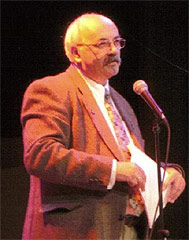
| HOME |
| NERVE |
| REVIEWS |
| ARCHIVE |
| EVENTS |
| LINKS |
| ABOUT US |
| CONTRIBUTORS |
| BACK ISSUES |
| CONTACT US |
 Liverpool
Poetry Festival
Liverpool
Poetry Festival
Various venues around Liverpool in April 2005
Reviewed by Hilary Oxford
Liverpool is one of the centres for poetry in the world. It was here that the Beat movement found its second home after a visit from Allen Ginsberg - one of the founding fathers of Beat. Poetry in Liverpool changed into a peculiarly Liverpudlian style best illustrated by the ‘Liverpool Poets’ Roger McGough, Adrian Henri and Brian Patten. The Liverpool style was based on cadence, repeated words and syntactical variation rather than the more usually recognized poetic markers. It found its natural voice in free verse and performance, and nearly forty years on it is still growing and developing using humour and observation as its cornerstone.
Liverpool has a preponderance of open floor events and many performers willing to fill those spots. The techniques vary, some are ragged, much of it is doggerel but here also you will find the best of the Liverpool poets and the legacy of Beat.
One performer amongst the many who has come to epitomize the true essence of poetry in Liverpool for me is Jim Bennett. Jim is a three time winner of the Dadafest award for performance, a very prestigious award voted on by people attending the disability arts festival. During the recent Liverpool Poetry Festival, it was Jim who turned up day after day on the streets of the town giving spontaneous performances to startled passers-by. I saw these on several occasions, often through the medium of my computer as he performed in areas which could be accessed through local webcams. It was a simple idea and one which enabled people round the world to see what was happening in Liverpool.
The most moving of the readings of the festival was on the fifteenth anniversary of the Hillsborough tragedy, which coincided with the festival. In a light rain a small group stood and listened to one of the most stunning performances of poetry I have ever witnessed. Jim read the poem ‘Hope Street’ on the steps of the University of Liverpool Continuing Education Centre, where he conducts courses. The poem had been published in the ‘Independent’ newspaper a few days earlier. It was an eerie experience; as he began to read the poem the busy street sounds of Liverpool quietened and all that you could hear was Jim’s voice slowly gaining in intensity and power as the poem progressed. As it ended we stood silent. Then there was a sudden outpouring of emotion as we clapped, some whooped in gratitude for a tremendous poem and a superb reading of it. This was followed by ‘Liverpool Is’ and to me these two poems symbolise what Liverpool stands for and the real reason why Liverpool won the European Capital of Culture in 2008. Liverpool has always had a sense of itself: a uniqueness which has been captured by its poets and which continues to be captured in the work of Bennett and Roger McGough.
Later that night Roger McGough and Brian Patten read their poems in the Metropolitan Cathedral Crypt to a capacity audience. The contrast between Jim in the afternoon on the steps of the building just along the road from the evening reading was profound.
There have been many criticisms of performance poetry over the years, some critics have called it over-simplified or too populist, but I believe that of all the poetry it is the sounds I heard from Jim Bennett and Roger McGough that will come to represent poetry in the late 20th and early 21st centuries in Liverpool.
Printer friendly page